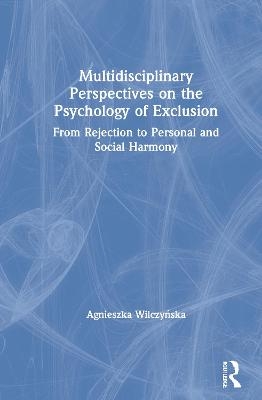
Multidisciplinary Perspectives on the Psychology of Exclusion
Routledge (Verlag)
9780367644666 (ISBN)
This new volume considers one of the most pressing topics of the generation: the sense of social exclusion, rejection and loneliness experienced by many adolescents and young adults. It offers insights from psychological and biochemical research, explaining the role of the brain, mind and body in the development of a sense of belonging over the lifespan.
Illustrated with examples of the consequences of exclusion drawn from the author’s clinical work, this important work surveys the latest research in the field and introduces an innovative framework for understanding the development of a sense of belonging. Wilczyńska considers the effects of social exclusion, exploring its consequences for mental health, particularly amongst young people, and reveals how transgenerational trauma imprinted at the early stages of human development impacts lifelong development.
Including a foreword by Philip Zimbardo, Multidisciplinary Perspectives on the Psychology of Exclusion is essential reading for students and researchers of developmental psychology, social psychology and sociology. It will also be of interest to practitioners and policymakers working with children and young people to understand and mitigate the effects of social exclusion and loneliness.
Agnieszka Wilczyńska is Professor of Psychology at WSB University, Toruń, Poland.
Acknowledgements Foreword Preface: on social exclusion, the bad and the good About this book: an overview of chapters PART I UNDERSTANDING SOCIAL EXCLUSION 1. Introduction 2. The Roots of Social Exclusion: A Disliked Topic 3. Psychosocial Issues of Social Exclusion: Special psychological phenomena in our societies 4. The Experience and Impact of Exclusion PART II EXPERIENCES OF EXCLUSION 5. How Young People Cope with Stress 6. Teenagers at Risk of Social Exclusion 7. The Orphan: Notes from a psychodynamic therapy III MULTIDISCIPLINARY PERSPECTIVES ON EXCLUSION 8. Transgenerational Trauma, Trust and Emotional Exclusion 9. Attachement and Exclusion: Can a wounded attachment be salvaged? 10. Non-Attachment Factors in the Forming of Relationships: The new generation and the old influences 11. Biopsychosocial factors: Biochemical processes, mind and body 12.The Mind in the Body or the Body in the Mind: where is the mind located? PART IV. BUILDING BELONGING 13. Building Self-Belonging in Schools: work with teachers 14. Prevention and Self-Soothing: Self-compassion and mindfulness for psychological wellbeing 15. Working Therapeutically with Socially-Excluded Adolescents: A case study 16. Positive Individual Human Development: Adults, experience, role and responsibilities 17. Recognising Memories, Emotions, Feelings and Thinking: Transformation and Thriving 18. Conclusion References Index
| Erscheinungsdatum | 25.01.2021 |
|---|---|
| Zusatzinfo | 6 Tables, black and white; 9 Line drawings, black and white; 9 Illustrations, black and white |
| Verlagsort | London |
| Sprache | englisch |
| Maße | 156 x 234 mm |
| Gewicht | 453 g |
| Themenwelt | Geisteswissenschaften ► Psychologie ► Allgemeine Psychologie |
| Geisteswissenschaften ► Psychologie ► Biopsychologie / Neurowissenschaften | |
| Geisteswissenschaften ► Psychologie ► Entwicklungspsychologie | |
| ISBN-13 | 9780367644666 / 9780367644666 |
| Zustand | Neuware |
| Informationen gemäß Produktsicherheitsverordnung (GPSR) | |
| Haben Sie eine Frage zum Produkt? |
aus dem Bereich


